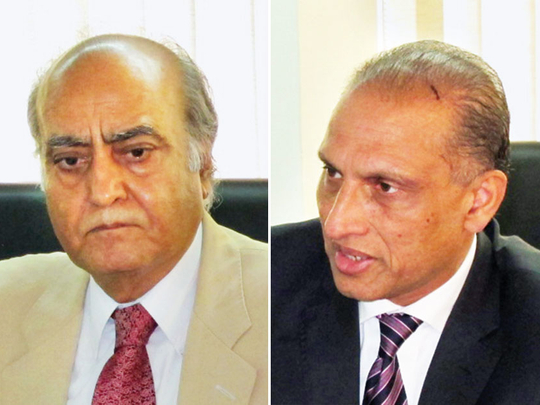
Islamabad: The issue of Afghanistan, a country torn by decades of war, is the major obstacle for ongoing efforts to improve relations between Pakistan and the United States, Islamabad officials have said.
Other hurdles include the growing “friendly neighbourhood” between Pakistan and China, with Washington concerned by Beijing’s growing influence, they added.
Despite 17 years of war in Afghanistan, peace has not returned to the country that was first on the list in America’s war on terrorism.
GALLERY: Colours of Pakistan
“It is mainly Afghanistan,” said Aizaz Ahmad Chaudhry, Director-General of the Institute of Strategic Studies Centre in Islamabad, to a question on the hurdles in the way of growing Pakistani-American relations.
“We would like to continue to cooperate with the US, we still want to do that, but we can’t take the blame for Afghanistan,” he said.
Washington has repeatedly called on Islamabad to do more to fight terrorism, but Pakistan has said it has already done its share.
After US Secretary of State Mike Pompeo’s visit to Pakistan last week, and his talks with Pakistan leadership on fighting terrorism, media outlets came out a day later with a statement by the new PM Imran Khan saying “we will never again fight someone else’s war’.
One paper added “Pakistan First” to its headline.
Pakistan denied Washington’s accusation that some militant groups, who are targeting the American troops in Afghanistan, are hiding in Pakistan or using bases in the country.
Islamabad says it has eliminated all the hideouts of militant groups and their members, paying a heavy price in its war on terrorism.
According to Pakistani officials and analysts the price has been the lives of 6,000 soldiers and 23,000 civilians, along with 123 billion dollars of economic losses in Pakistan war to eradicate terrorism on its soil.
“With Pakistanis having successfully eliminated terrorism in many ways, we need to secure ourselves with greater military action in Afghanistan,” said Aizaz Chaudhry, director-general of the Institute of Strategic Studies, Islamabad, noting that thousands of people from either side used to crossed the border with no documentation, but this had been curbed.
“There will be tendency for people to come to Pakistan, and we don’t want that to happen,” Chaudhry said. “We are very keen of border management.”
He said border management should be part of the solution.
“Every country is entitled to secure borders,” he said. “We are creating fences, points of customs, that is very important for us.”
Chaudhry said there was also a need to solve the issue of nearly three million Afghani refugees who have already crossed into Pakistan.
Meanwhile, Minister of Information Fawad Chaudhry, in a meeting with a visiting UAE media delegation to Pakistan recently, said wars were not won on battlefields.
“Wars are won on the table, wars are won by diplomacy,” said Fawad Chaudhry, a member of the newly formed cabinet. “And here, the US has failed in offering the peaceful solutions to the people of Afghanistan, and to the region also.”
The US and the Afghan Taliban have been talking indirectly to each other for “a long time”, analysts say.
Islamabad itself hosted, in 2015, a round of talks between Afghanistan’s government and the Taliban. Pakistan, the US and China attended as observers.
The Taliban have been insisting on the withdrawal of all foreign troops before any talks with the Americans.
But the US is saying the troops are there at the request of the legitimate elected government of Afghanistan, and that the Taliban need to talk to the government to find a political solution.
In Aizaz’s view, different parties should come to the table “without any precondition”, and that there should be “a responsible withdrawal” of foreign troops from Afghanistan.
“We are saying that because we don’t want Afghanistan to descend into a civil war again, because if there is civil war, we will bear the brunt,” he said. “More refugees will come, criminals, smugglers will come, Kalashnikov culture will come, all that we will suffer once again,” he added.
The chairman of the Institute of Strategic Studies board’, Khalid Mahmoud, said that Pakistan wants to have good relations with the US, and will exert every effort to achieve such a goal, but the Pakistani-American relationship “has to be seen in the context of the global US-China-Russia relations”.
Relations between the two neighbouring nations, Pakistan and China, are strong and friendly, especially in the economic and financial fields. But there were lots of “misunderstanding and propaganda”, he said.
“What is wrong with investments coming from China? [and how they differ from those from] France, Germany and UK?,” he asked. “What is kosher for western countries should be kosher for other countries … All [Chinese] investments, loans, and grants are used for productive purposes” in Pakistani economy.












